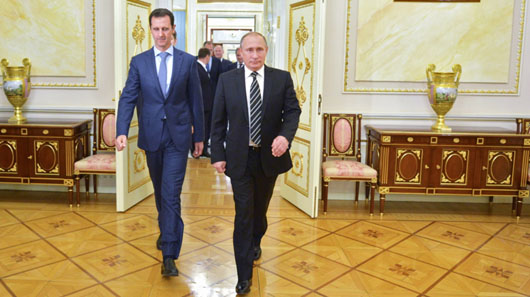by WorldTribune Staff, July 5, 2017
The United States will focus on defeating Islamic State (ISIS) and defer to Russia when the time comes to decide Syrian President Bashar Assad’s fate, a report said.
Secretary of State Rex Tillerson told UN Secretary-General Antonio Guterres during a private State Department meeting last week that Russia is in the driver’s seat when it comes to Assad’s future as Syrian leader, a clear signal that the U.S. will not concern itself with the shape of a post war government and society in Syria, Foreign Policy reported on July 3.

Tillerson said that any U.S. military action against Assad’s forces is aimed at limited tactical goals, including deterring future chemical weapons attacks and protecting U.S. backed-forces fighting ISIS.
Syria’s government, backed by Russia and Iran, “is emerging as the likely political victor in the country’s six year long civil war,” the Foreign Policy report said.
Tillerson’s nod to Russia is also a departure from Obama administration policy which backed the 2012 UN-brokered Geneva Communique calling for the establishment of a transitional government in Syria consisting of members of the regime and the opposition.
The Obama administration and other Western allies said the Geneva pact was to result in Assad’s departure, “though the Obama administration softened its own demand that Assad step down during its final year in power,” the report said.
A State Department official declined to comment on Tillerson’s private discussion with Guterres, but insisted that the U.S. remains “committed to the Geneva process” and supports a “credible political process that can resolve the question of Syria’s future. Ultimately, this process, in our view, will lead to a resolution of Assad’s status.”
“The Syrian people should determine their country’s political future through a political process,” the official added.
Trump’s policy in Syria has the “benefit of keeping America’s distance from what promises to be a less than peaceful, chaotic post war atmosphere,” Rick Moran wrote for American Thinker on July 4.
The policy, however, “also carries a geopolitical cost; it empowers and gives influence to Russia in the Middle East after decades of U.S. policies that sought to prevent that eventuality.”
Russian President Vladimir Putin is backing the Assad regime with the intent of establishing a military presence “where they’ve never had one before,” Moran wrote. “Putin will have new clients for Russian arms, as well as states willing to back his foreign policy.”
Since the U.S. no longer needs Middle Eastern oil, Europe “may have to take a more active role in the region due to their dependence on Russian natural gas and Middle Eastern oil,” Moran wrote.
“The U.S. retreat from Syria and the Middle East was inevitable once our need for the oil disappeared. And Europe, once dependent on the U.S. Navy to keep the oil shipping lanes open, will eventually have to fend for themselves.”
Letters to the Editor __ Subscribe to Geostrategy-Direct __ Support Free Press Foundation
